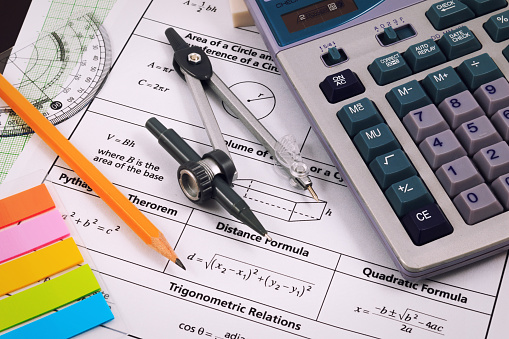Revising for your Maths exam? It can be hard to know how to revise Maths as it’s a tricky subject, so here are some revision techniques that I found really helped me at A-Level.
Read how to get an A* in A-Level Biology
1. Go through your specification and highlight each topic according to difficulty
Everyone will have different parts of Maths they find easier/harder so I would recommend going through your specification and picking three different colours to highlight the topics. Colour code them, easy/medium/hard, so you can see which ones you find the most difficult.
You can use this to help plan revision: spend more time on the topics you have identified you find the hardest and then less on the ones you find easier. This means you’re not wasting loads of time on the areas you find easy – but make sure you do still revise them, so you don’t forget those topics!
Start with one of the things you struggle with, so you’ll quickly see yourself making progress.
Read 5 Tips on Making the Perfect Revision Notes>>
2. Bunch together past paper questions on a specific topic
The majority of my Maths revision was just doing past paper/textbook questions and I found grouping the questions together into the different topics, for example, integration or vectors, and then doing blocks of these questions really worked.
Look over your notes on a specific topic and then work through a bunch of questions on it. You’ll quickly see similarities between questions and common things that come up, and this really helps to ensure you know a topic.
Read 5 Tips to Beat Revision Procrastination>>
3. Make flashcards/posters with key formulae/equations
There are a lot of formulae and equations in Maths you need to learn. To help learn them all, I made flashcards with the key ones on for each unit. For example, with all the different variations of sin/cos/tan graphs on them.
Then I’d just go through these cards regularly when I had a moment to make sure I knew all the formulae/equations. You could also write them all on posters and put them around your house so when you go into certain rooms or do specific tasks you can revise them.
Use your posters/flashcards the night before an exam to make sure that content is at the front of your mind.
Read 3 Step A-Level Revision Method>>
4. Do past papers under timed conditions
You will probably have done lots of questions/past papers as part of your Maths revision, but it can be easy to do them without realising how much time it’s taken you.
Try timing yourself when you do past papers to see how long it takes you and then you can see if you’re taking longer/ shorter than the time you will have. Try to finish papers with still time to check as you’ll want to be able to do this in the real exam.
Read 4 Ways to Use A-Level Past Papers>>
5. Work through questions with friends
One of the best ways to know if you’ve understood something in Maths is to then try and explain it to someone else. Working through questions with friends can help you all see if you understand everything and people have different methods which you can discuss.
You might well find the way someone else does something is a lot quicker or easier than the method you’ve been using. Also, if you come across particularly difficult questions, working all together you’re more likely to get to the answer.
Words: Rachael Foulsham

